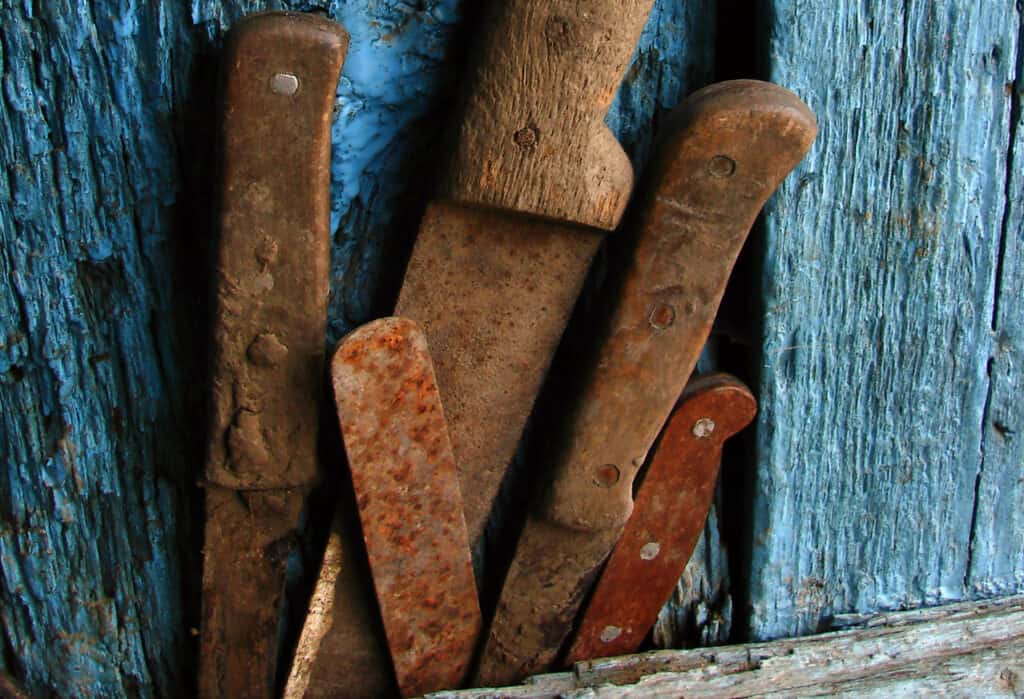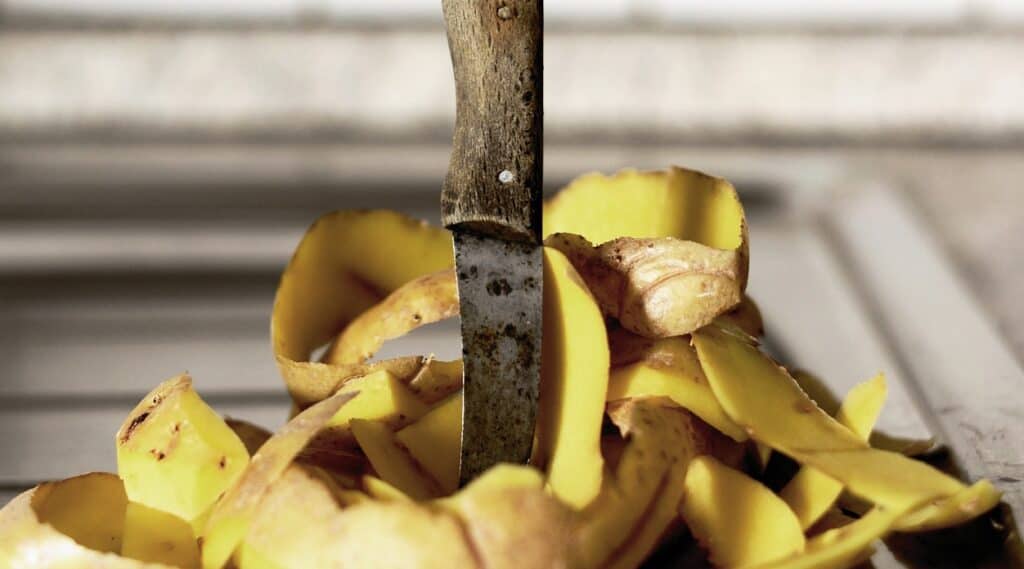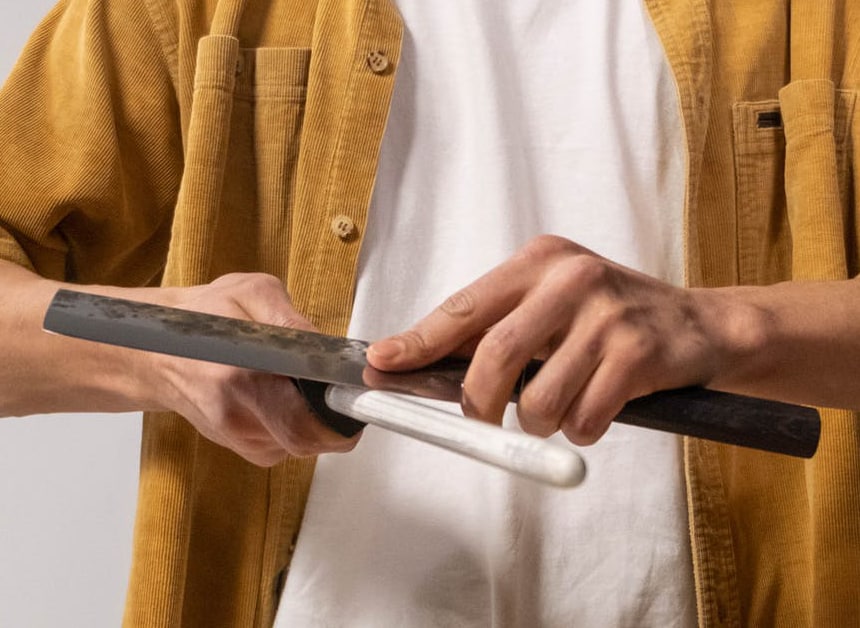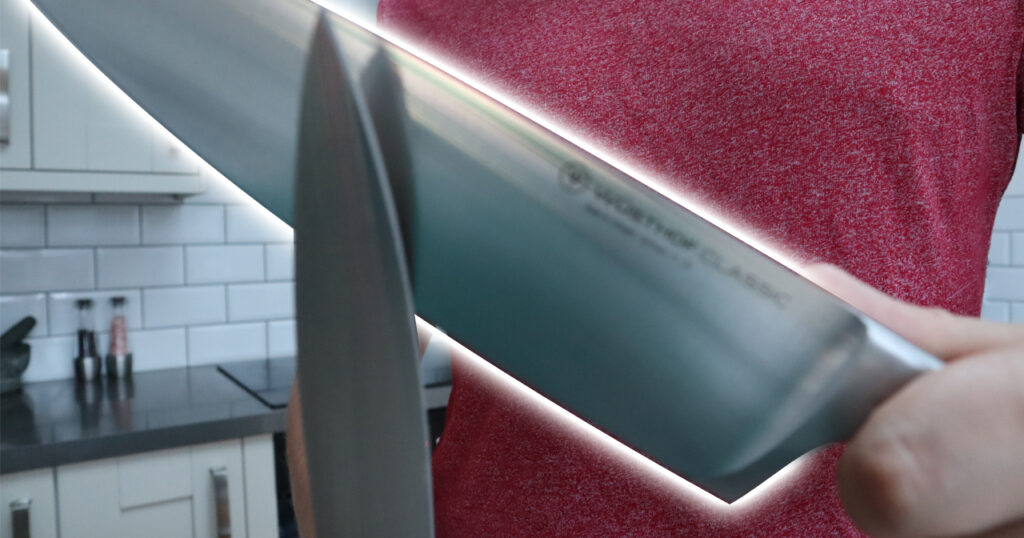
Rust, the ultimate enemy of the kitchen utensils.
It’s a true tragedy to see perfectly good knives being left to rust away but it is easily avoidable
In this article, I’m going to tell you why knives rust and how to prevent it.
The key to preventing rust is to minimize the knife’s exposure to moisture. Even stainless steel knives will rust if not taken care of properly. The best way to care for your knife is to wipe it down after every use with some washing soap and a cloth. Make sure the knife is nice and dry before putting it back into storage.
Can stainless steel knives rust
Yes, stainless steel knives can rust.
Stainless steel knives are often marketed as being non-rust. Hence the name, stainless steel objects should be stain-less.
Unfortunately, this just isn’t the case, most kitchen knives should really be rebranded as stain-resistant as rust is always a potential threat.
Therefore, we all need to be aware of how to prevent knives from rusting if we want to get the most use out of them, especially if you’ve invested in a particularly good set.
The cause of rust

Rust is the common name of iron oxide. To create rust we need three things, iron, water and oxygen.
As you might have guessed, pretty much all kitchen knives contain one of these components, iron.
You’re not going to be able to avoid bringing your knives in contact with oxygen and water is always going to a part and parcel of cooking and washing up.
So, you can start to see why knives, in particular, are in danger of gathering a lot of rust very quickly.
Why stainless steel is rust-resistant
Iron rusts very easily; however, stainless steel resists rust very effectively.
This is due to the addition of chromium. Chromium is a very active element, as such, it reacts with oxygen before the iron has a chance to. Once it reacts it creates a thin layer of chromium oxide.
The chromium oxide layer prevents water and oxygen from reaching the iron, therefore removing two of the components necessary for creating iron oxide, AKA rust.
Stainless steel has different levels of rust resistance
There are different grades of stainless steel which will make particular knives more rust-resistant.
For a knife to be classified as a stainless steel knife then the blade must contain at least 10% chromium.
The more chromium the knife contains the more resistant to rust it will be.
| Chromium content | Rust resistance |
| 10% | Very Low |
| 15% | Average |
| 20% | Very High |
You can often see a difference in appearance in knives based upon their chrome content.
Higher quality knives will often be a brighter, whiter color. Lower quality stainless steel knives will appear a duller, more grey color.
Very high-quality stainless steel knives contain around 20% chromium, with low-quality knives being around 10%.
Kitchen knives are especially in danger of rusting
Kitchen knives live in an environment where they are always going to be especially at risk of building rust
We’ve discussed that rust needs three elements, iron, oxygen and water and since knives are often coated in moisture whilst in use and again are washed using water it is easy for knives to become rusty if they aren’t looked after properly.
That’s why it is so important to care for your knives properly to prevent any rust build-up.
Your knives are probably your most important kitchen tool, and a good kitchen knife can cost quite a lot of money, so it’s important to treat them right, let’s take a look at ways in which we can prevent knives from rusting.
How to stop knives from rusting
The best method is always prevention. Stop the rust before it accumulates. Here’s our guide to preventing your knives from rusting at all:
- Always clean and dry your knives after you have used them. Wipe the blade down with a wet cloth and soapy water. Then dry it off using a towel. Try to avoid leaving your kitchen knives to air dry unless the room is warm enough for them to dry quickly.
- Avoid cleaning your knives in the dishwasher. The heat and humidity won’t be much good for your knife, depending on the type of knife you have it could also cause issues for your knife handle too, so try to always clean knives manually.
- If you must use a dishwasher then make sure the knives don’t sit in there after the wash. Take the knives out and dry-wipe them down before storing them. If you don’t have enough time to empty the dishwasher right when it’s finished then open the dishwasher door and pull the shelves out whilst it’s still warm, this the heat will help dry the knives more quickly.
- Never leave your knives wet, or in a humid environment. Don’t leave them on the side after use, and don’t go through the trouble of drying your knife, just to store them in a drawer with wet towels or other wet cutlery.
How to remove rust from a knife
If the prevention opportunity has passed and you (like me!) have been left with a rusty knife then there are some things you can to remove the rust. Rust isn’t dangerous, so you’re not going to cause yourself any issues by using a knife with a little rust, but let’s take a look at some methods using general household items we can use to remove that pesky rust:
- Vinegar. You will want to cover your knife blade in white vinegar (make sure its white vinegar as some other types may actually damage your knife). To do this you could either pour vinegar into a wide-based pan such as a frying pan and then place the knife in, or you could soak a cloth or kitchen towel in the white vinegar and then wrap it around the blade. Let the blade sit in the vinegar for around 5 minutes, then remove the knife and wipe down the blade with a dry cloth.
- Lemon juice. This method is pretty much identical to the vinegar method, you’re just substituting vinegar for lemon juice. It’s a useful backup in case you don’t have any white vinegar in your house.
- Baking Soda. Add a little water to half a bowl of baking soda, stir it up and you’ll get a thick paste. Apply this paste to your knife blade and let it sit for around 5 minutes. Then us an abrasive sponge to rub-down the blade with the baking soda still on. After you’ve rubbed the whole blade dry the knife off using a cloth.
Be careful with carbon knives in particular
We’ve talked about how stainless steel knives are somewhat protected by the chromium within their blade.
One important thing to note about carbon knives is that they do not contain protective chromium and will rust extremely easily.
You must keep very good care of a carbon knife, never leave it wet and never ever put it in the dishwasher!

